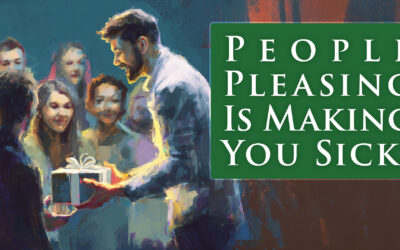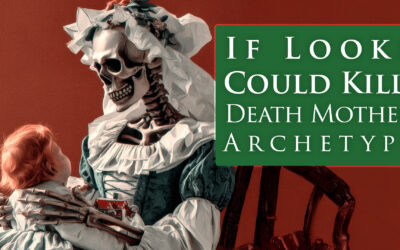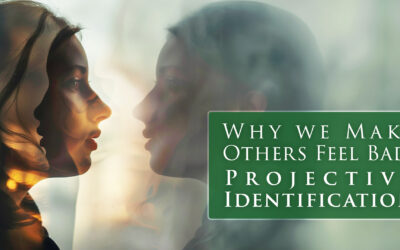People Pleasing is a compulsive strategy that disavows your needs and surrenders your agency. It begins in family systems that only reward compliance, which produces a false self. If your soul is constantly devalued, you may develop dependent narcissism with a covert contract: “I’ll keep you happy, and you’ll keep me safe.” Healing comes when you identify your true experience—notice whether you feel drained, tense, or obligated versus calm, interested, or genuinely willing. Give yourself permission to pause before agreeing. Say, “I’ll think about it,” step away to check in, rate how much you do or don’t like the request and give a clear yes/no. Say yes only when it aligns with your values and can be revised; a yes aimed at managing someone else’s mood or bolstering your self-worth is unhealthy and requires deeper work. Growth requires inner authority and the courage to be disliked so that your choices follow Psyche rather than external approval.
If Looks Could Kill: Surviving the Death Mother
Oct 2, 2025
Some mothers attack life in their children. They crush appetite, joy, curiosity, and initiative. They call it love or duty. It is not love. It is domination dressed as care. She withholds warmth to make the child obedient. She intrudes when the child needs space and vanishes when the child needs help. She shames tears, punishes play, mocks ambition, and polices the body. She turns boundaries into punishments and favors into chains. The Death Mother archetype is ancient and modern, requiring careful confrontation to free the parent and the child from its destructive grip.
Sibling Rivalry: archetypal conflicts and shadow dynamics in families
Jun 5, 2025
Sibling rivalry can bruise and build in equal measure. On the hard side, the older child feels toppled from the throne, the younger scrambles for a foothold, and both learn how quickly envy, resentment, and score-keeping ignite—whether over a parent’s extra hour of attention or the larger slice of birthday cake. Those early contests can calcify into adult grudges that surface in estate negotiations, workplace jockeying, or mismatched relationships. Yet the same daily friction teaches useful skills: we sharpen empathy by reading a sibling’s next move, develop a theory of mind through constant negotiation, and discover that competition does not rule out loyalty—especially when a crisis calls every rival home. Listen and discover how sibling rivalry is both the first training ground for conflict and the first workshop for cooperation, shaping how we handle fairness, attachment, and resilience for the rest of our lives.
The Boundary Paradox: How Limits Create Freedom
Mar 20, 2025
Psychological boundaries are the invisible lines that define our limits – what we consider acceptable or unacceptable in interactions and within ourselves. The term boundary is metaphorical, borrowed from the idea of a line separating areas: what lies “in-bounds” is permitted, while what lies “out-of-bounds” is off-limits. In practice, personal boundaries help clarify where one person ends and another begins, both physically and emotionally. Maintaining healthy boundaries is widely regarded as a hallmark of emotional maturity and well-being. crucial for preserving one’s identity, safety, and mental health in relationships and social life.
FACING REJECTION
Feb 13, 2025
Facing Rejection, as an elemental psychological experience, functions as both a destabilizing force and a catalyst for transformation. It operates not only at the personal level but ripples through cultural, mythological, and archetypal layers, embedding itself in the architecture of Psyche. Whether rejection arises from interpersonal relationships, societal exclusion, or internal conflicts, its presence initiates a confrontation with the unconscious. This often takes the form of shadow projection, where disowned traits are seen in others, creating cycles of resentment, isolation, or rage. But within this dynamic lies an opportunity: the rejected individual, when engaging consciously with this pain, can redirect it towards individuation. Without this engagement, rejection festers, creating neurotic symptoms or destructive behaviors that further alienate the individual from the outer world and inner wholeness.
Wedding Dreams: Symbols of Sacred Union and Inner Transformation
Nov 14, 2024
Wedding dreams, symbols of sacred union and inner transformation, signal psychic movement toward inner union that leads to the incarnation of the Self. Through wedding dream analysis, we encounter the wedding archetype, which makes us face the fascinating internal opposite—both in the form of masculine and feminine elements, as well as our hidden shadow. The lesser infernal marriage symbolizes reunion with disowned shadow traits. This symbolic wedding transformation, drawn from alchemical traditions, offers images of the various stages from the initial approach through the final merging that reveals the divine hermaphrodite. This human amalgam is an archetypal image where opposites are merged without diminishing either polarity and is still more than the sum of its parts. Wedding dreams of all kinds provide insights into the innumerable varieties of unions and the struggle to create an opus.
Why We Make Others Feel Bad: understanding projective identification
Apr 4, 2024
Projective identification, first highlighted by Melanie Klein through observations of infant-mother interactions, is a cornerstone of psychoanalytic theory. It describes the process where an individual unconsciously projects disowned feelings, desires, or self-aspects onto another, manipulating the relational context to evoke these projected feelings or behaviors in the other, thus creating a validating feedback loop.
The Psychology of Strife: What Lies Beneath Our Conflicts?
Mar 7, 2024
Conflict, both inner and outer, is a fundamental part of the human experience. We engage in conflicts externally with others and internally within ourselves, reflecting the complex nature of human relationships and the psyche. Our external conflicts often mirror internal struggles, serving as manifestations of unresolved or unacknowledged inner turmoil. Recognizing the projection of our inner conflicts onto external situations can lead to deeper self-awareness and understanding.
UNREQUITED LOVE: Can Eros be revived?
Feb 15, 2024
The arrows of Eros strike our hearts, and we are filled with wild love. Psychotherapists call this limerence, that initial stage of love when all we ache for is found in one person. This projection can carry us into a new relationship with intrepid confidence for a time. If that love is unreturned, a second archetype, Anteros, is called forth to punish those who reject love. Armed with his lead club, he strikes the unloving and drives them to ruin.
DIVORCE: How can heartbreak lead to transformation?
Jan 11, 2024
The paradox of trust and betrayal lies at the core of intimate relationships. Trust, deeply entwined with love and commitment, harbors the risk of profound betrayal. This duality is inherent in close relationships, where the potential for betrayal exists alongside trust. While a source of profound connection, the intimate bond simultaneously sets the stage for possible betrayal, which, when realized, disrupts internal harmony, propelling psychological growth.
Why Do We Push People Away? Understanding our Defenses
Sep 28, 2023
Defense mechanisms function as unconscious psychological strategies we deploy to navigate reality and sustain a consistent self-image. They act as a shield, guarding against feelings of anxiety, shame, and vulnerability. They are feeling states that prompt us to avoid contact and trick us into thinking they protect us against emotional harm.
Three Voices, One Song: lessons in friendship
Aug 17, 2023
With high spirits, we three revisit our first meeting and reflect on the discovery of kinship between us. Our experiences of trust, reciprocity, and shared hardship marked by endless conversations and abundant laughter forged our bond during analytic training. Yet it reflects more than our shared life; friendship is archetypal.











